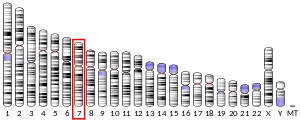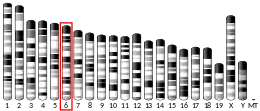| CPA5 | |||||||||||||||||||||||||||||||||||||||||||||||||||
|---|---|---|---|---|---|---|---|---|---|---|---|---|---|---|---|---|---|---|---|---|---|---|---|---|---|---|---|---|---|---|---|---|---|---|---|---|---|---|---|---|---|---|---|---|---|---|---|---|---|---|---|
| Identifiers | |||||||||||||||||||||||||||||||||||||||||||||||||||
| Aliases | CPA5, carboxypeptidase A5 | ||||||||||||||||||||||||||||||||||||||||||||||||||
| External IDs | OMIM: 609561 MGI: 1921899 HomoloGene: 62246 GeneCards: CPA5 | ||||||||||||||||||||||||||||||||||||||||||||||||||
| |||||||||||||||||||||||||||||||||||||||||||||||||||
| |||||||||||||||||||||||||||||||||||||||||||||||||||
| |||||||||||||||||||||||||||||||||||||||||||||||||||
| |||||||||||||||||||||||||||||||||||||||||||||||||||
| |||||||||||||||||||||||||||||||||||||||||||||||||||
| Wikidata | |||||||||||||||||||||||||||||||||||||||||||||||||||
| |||||||||||||||||||||||||||||||||||||||||||||||||||
Carboxypeptidase A5 is an enzyme that in humans is encoded by the CPA5 gene.[5][6]
Carboxypeptidases have functions ranging from digestion of food to selective biosynthesis of neuroendocrine peptides. Members of the A/B subfamily of carboxypeptidases, such as CPA5, contain an approximately 90-amino acid pro region that assists in the folding of the active carboxypeptidase domain. Cleavage of the pro region activates the enzyme (Wei et al., 2002).[supplied by OMIM][6]
References
- 1 2 3 GRCh38: Ensembl release 89: ENSG00000158525 - Ensembl, May 2017
- 1 2 3 GRCm38: Ensembl release 89: ENSMUSG00000029788 - Ensembl, May 2017
- ↑ "Human PubMed Reference:". National Center for Biotechnology Information, U.S. National Library of Medicine.
- ↑ "Mouse PubMed Reference:". National Center for Biotechnology Information, U.S. National Library of Medicine.
- ↑ Wei S, Segura S, Vendrell J, Aviles FX, Lanoue E, Day R, Feng Y, Fricker LD (Apr 2002). "Identification and characterization of three members of the human metallocarboxypeptidase gene family". J Biol Chem. 277 (17): 14954–64. doi:10.1074/jbc.M112254200. PMID 11836249.
- 1 2 "Entrez Gene: CPA5 carboxypeptidase A5".
External links
- Human CPA5 genome location and CPA5 gene details page in the UCSC Genome Browser.
Further reading
- Gerhard DS, Wagner L, Feingold EA, et al. (2004). "The Status, Quality, and Expansion of the NIH Full-Length cDNA Project: The Mammalian Gene Collection (MGC)". Genome Res. 14 (10B): 2121–7. doi:10.1101/gr.2596504. PMC 528928. PMID 15489334.
- Ota T, Suzuki Y, Nishikawa T, et al. (2004). "Complete sequencing and characterization of 21,243 full-length human cDNAs". Nat. Genet. 36 (1): 40–5. doi:10.1038/ng1285. PMID 14702039.
- Hillier LW, Fulton RS, Fulton LA, et al. (2003). "The DNA sequence of human chromosome 7". Nature. 424 (6945): 157–64. Bibcode:2003Natur.424..157H. doi:10.1038/nature01782. PMID 12853948.
- Bentley L, Nakabayashi K, Monk D, et al. (2003). "The imprinted region on human chromosome 7q32 extends to the carboxypeptidase A gene cluster: an imprinted candidate for Silver-Russell syndrome". J. Med. Genet. 40 (4): 249–56. doi:10.1136/jmg.40.4.249. PMC 1735416. PMID 12676894.
- Strausberg RL, Feingold EA, Grouse LH, et al. (2003). "Generation and initial analysis of more than 15,000 full-length human and mouse cDNA sequences". Proc. Natl. Acad. Sci. U.S.A. 99 (26): 16899–903. Bibcode:2002PNAS...9916899M. doi:10.1073/pnas.242603899. PMC 139241. PMID 12477932.
- Bonora E, Bacchelli E, Levy ER, et al. (2002). "Mutation screening and imprinting analysis of four candidate genes for autism in the 7q32 region". Mol. Psychiatry. 7 (3): 289–301. doi:10.1038/sj.mp.4001004. PMID 11920156. S2CID 13282515.
- "A full genome screen for autism with evidence for linkage to a region on chromosome 7q. International Molecular Genetic Study of Autism Consortium". Hum. Mol. Genet. 7 (3): 571–8. 1998. doi:10.1093/hmg/7.3.571. hdl:11858/00-001M-0000-0012-C9D8-C. PMID 9546821.
This article is issued from Wikipedia. The text is licensed under Creative Commons - Attribution - Sharealike. Additional terms may apply for the media files.



